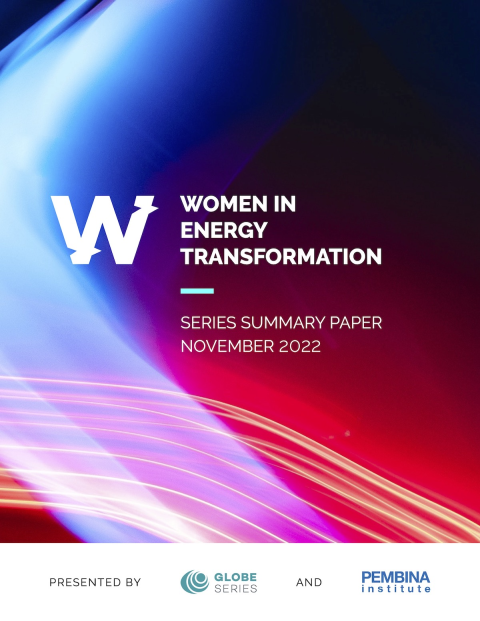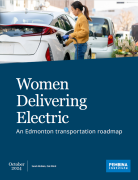Canada has committed to reducing greenhouse gas emissions 40 to 45 per cent by 2030 as a critical milestone towards achieving net-zero emissions by 2050. Former Bank of Canada and Bank of England governor Mark Carney has made the case that Canada’s pathways to net-zero represent a once-in-a-lifetime economic opportunity for Canadian leadership, both at home and abroad.
In discussions of climate change, we see statistics around women and children being among the most vulnerable, but when it comes to climate action, we’re also seeing women and girls being among the most vocal, and those leading the charge in terms of action. While the shift to a net-zero economy and society represents a major opportunity for Canada’s energy systems, infrastructure, and resources, women are currently underrepresented, both as workers and as leaders, in many of the sectors that will make the net-zero future a reality.
Supported by research and analysis by the Pembina Institute, the goal of the Women in Energy Transformation Series was to show how women can participate in and benefit from the move to an inclusive, net-zero energy economy. It identified strategies that individuals, companies, and governments can implement to ensure gender equality is an essential component of Canada’s energy future. And it sought to raise the profile of women who are at the forefront of energy system innovation in Canada.
The Women in Energy Transformation Series was made up of four national dialogues, featuring 20 speakers from across the country. The dialogues featured compelling interviews and panel discussions with women from different disciplines and backgrounds who are leading the energy transition in their companies, organizations, and communities. Speakers addressed critical topics, provided testimonials, and shared stories based on their own experiences, and discussed both their concerns and opportunities for success.
Each dialogue included opportunities for smaller group connection and networking with all participants.
In addition to the live events, the series developed a unique online tool that profiled 100 women and gender-diverse people, in various stages of their career, who are leading the way to a clean energy future.
Individuals profiled on the platform were selected via an independent nomination process led by Women in Renewable Energy, a Canadian based non-profit organization whose purpose is to advance the role and recognition of women and other under-represented groups working in the energy sector.
Throughout the series, we explored barriers to gender equity in our current systems and together considered how to make the net-zero future one where all people in Canada have a chance to participate and lead.
We thank all the participants—speakers and profiled leaders alike—for their involvement in this project.
The coming decades bring many challenges, but with equity and inclusion as a guiding principle, we can make the future more sustainable and just.
The Women in Energy Transformation Series
Dialogue 4: Towards an Equitable Net-Zero Future: Stories, Lessons Learned and Actions for Advancing Gender Equity
Oct. 14, 2022
Dialogue 3: Solutions, Career Pathways, and Intergenerational Networking
following the GLOBE Forum Women’s Lunch
Mar. 31, 2022
Dialogue 2: Minding the Gap: Barriers and Key Themes in Equality and Inclusion
Destination Net Zero: Nature and Bioeconomy Days Session
Nov. 24, 2021
Dialogue 1: Profiling Women Leaders of the Energy Transformation
Destination Net Zero: Energy and Transportation Days Session
Sep. 29, 2021





